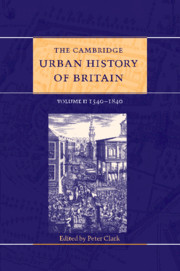Book contents
- Frontmatter
- 1 Introduction
- Part I Area surveys 1540–1840
- Part II Urban themes and types 1540–1700
- Part III Urban themes and types 1700–1840
- 14 Urban growth and economic change: from the late seventeenth century to 1841
- 15 Population and society 1700–1840
- 16 Politics and government 1700–1840
- 17 Culture and leisure 1700–1840
- 18 The transformation of urban space 1700–1840
- 19 London 1700–1840
- 20 Regional and county centres 1700–1840
- 21 Ports 1700–1840
- 22 Small towns 1700–1840
- 23 Health and leisure resorts 1700–1840
- 24 Industrialising towns 1700–1840
- 25 Conclusion
- Select Bibliography
- Index
- References
20 - Regional and county centres 1700–1840
from Part III - Urban themes and types 1700–1840
Published online by Cambridge University Press: 28 March 2008
- Frontmatter
- 1 Introduction
- Part I Area surveys 1540–1840
- Part II Urban themes and types 1540–1700
- Part III Urban themes and types 1700–1840
- 14 Urban growth and economic change: from the late seventeenth century to 1841
- 15 Population and society 1700–1840
- 16 Politics and government 1700–1840
- 17 Culture and leisure 1700–1840
- 18 The transformation of urban space 1700–1840
- 19 London 1700–1840
- 20 Regional and county centres 1700–1840
- 21 Ports 1700–1840
- 22 Small towns 1700–1840
- 23 Health and leisure resorts 1700–1840
- 24 Industrialising towns 1700–1840
- 25 Conclusion
- Select Bibliography
- Index
- References
Summary
it is now widely recognised that towns played a central role in the development of a new, more modern British economy and society in the years between 1700 and 1840. However, it is often assumed that the expansive element in urban society, the new social attitudes and cultural values that were helping to change patterns of consumer demand, to mobilise capital resources and to generate novel industrial processes and products, were confined to the great metropolis of London and the specialist ports, resorts and industrial towns whose growth attracted so much attention from contemporary observers. Nevertheless, it would be a mistake to ignore the role played in this process by the established regional centres and historic county towns, many of which retained their importance well into the late eighteenth and early nineteenth centuries. Their experiences during this period of substantial and sometimes dramatic change in the urban system encompass every possible permutation from explosive population growth to sullen stagnation and raise pertinent questions about the very nature of ‘success’ in the context of urban development. Rather than being passive spectators of a drama taking place elsewhere, regional and county centres were fully involved in the action.
STATUS, FUCTIONS AND PATTERNS OF DEVELOPMENT
A substantial number of the ‘Great and Good towns’ of early modern England fell into the category of county centres, towns whose social and economic influence over a broad hinterland beyond their immediate market area was recognised by their contemporary classification as ‘the capital of all the county’ or simply ‘county town’.
- Type
- Chapter
- Information
- The Cambridge Urban History of Britain , pp. 673 - 704Publisher: Cambridge University PressPrint publication year: 2000
References
- 4
- Cited by

